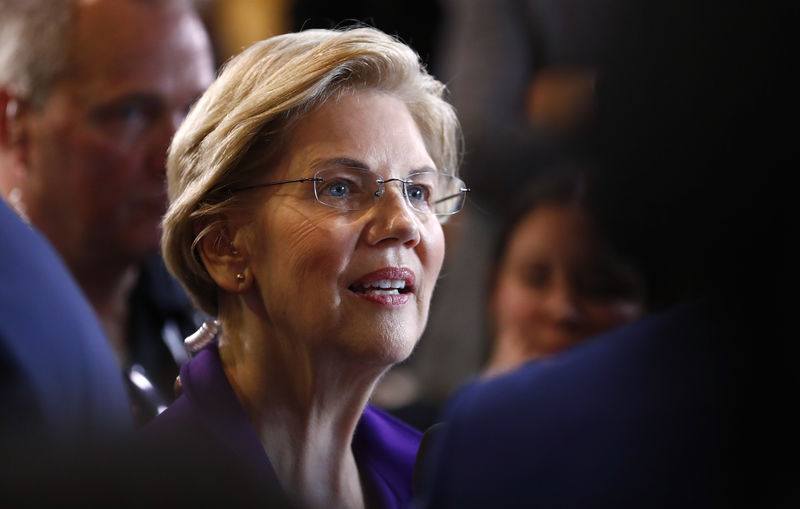By James Oliphant
WASHINGTON (Reuters) - Ten of the 18 candidates seeking the Democratic nomination to face Republican President Donald Trump in November 2020 will take the stage in Atlanta on Wednesday in the party's fifth primary debate.
Here are some key moments to watch for.
WARREN UNDER FIRE
The ongoing fight over how best to expand health insurance for Americans is likely to be a main point of contention and could see U.S. Senator Elizabeth Warren on the defensive.
Warren has seen some of her momentum stall as her candidacy has been consumed by questions about her ambitious plan to provide universal healthcare for all Americans without raising middle-class taxes one penny.
Warren has estimated Medicare for All, which would eliminate private insurance in favor of a government-run plan, would cost $20.5 trillion in additional government spending over 10 years. The plan would be funded by tax increases for corporations and the wealthy, most notably billionaires.
The lawmaker from Massachusetts may again find herself under fire from moderate rivals such as former Vice President Joe Biden and Pete Buttigieg, who challenge her math and also argue that Medicare for All will scare away voters who do not want to lose private health insurance.
Warren may also be criticized by fellow progressive candidate Bernie Sanders for not being sufficiently liberal, after saying on Friday that transition to Medicare for All would take place gradually over three years.
"If anything, she has opened herself to more attacks and more scrutiny," Joel Payne, a Democratic strategist who worked for Democrat Hillary Clinton's 2016 presidential campaign, said.
WILL PETE SUSTAIN MOMENTUM?
Buttigieg, the 37-year-old mayor of South Bend, Indiana, has seen his stock steadily rise in Iowa, the first state that will hold a 2020 nominating contest, and some recent polls have him in the lead there.
Buttigieg's ascent has coincided with finding his political identity as a more moderate alternative to Warren and Sanders, threatening Biden's claim on that position.
But his surge may also place him under heavy criticism from rivals, who have already questioned his relative lack of experience and his thorny relationship at times with the African-American community.
BLOOMBERG AND PATRICK IN SPIRIT?
Deval Patrick, the former governor of Massachusetts, jumped into the race last week, while former New York Mayor Michael Bloomberg continues to ponder a bid.
Sanders' campaign, looking to play up his opposition to wealthy and corporate interests, said the U.S. senator from Vermont was ready to go after Bloomberg and Patrick, both wealthy businessmen, in absentia.
Sanders flagged this approach at an Iowa rally on Nov. 9, when he said of Bloomberg: "Sorry, you ain't gonna buy this election."
Going into the debate, Sanders' campaign is looking to play up his long record of getting under the skin of the wealthy and corporate interests, and remind voters that he is the candidate consistently taking on what his supporters see as “the bad guys,” a campaign aide said.
Biden may be queried about whether moderates Bloomberg and Patrick will siphon support from him. If Bloomberg enters the race, he will be the fifth most-popular candidate, and his presence may draw more support away from Biden than others, a Nov. 12-14 Reuters/Ipsos public opinion poll showed.
WHITHER HARRIS?
With her campaign faltering amid reports of poor organization and in-fighting, U.S. Senator Kamala Harris’ candidacy needs more than just a jumpstart.
Harris, the breakout star of the first Democratic debate, is trailing badly in the early-voting states, particularly in Iowa, a state she has said will make or break her campaign.
At this point, a strong performance on Wednesday might only be the first step in turning things around, Payne said, noting that the debates so far have done more to reduce the sprawling field, rather than boost campaigns.

"They are not elevating," he said. "They are eliminating."